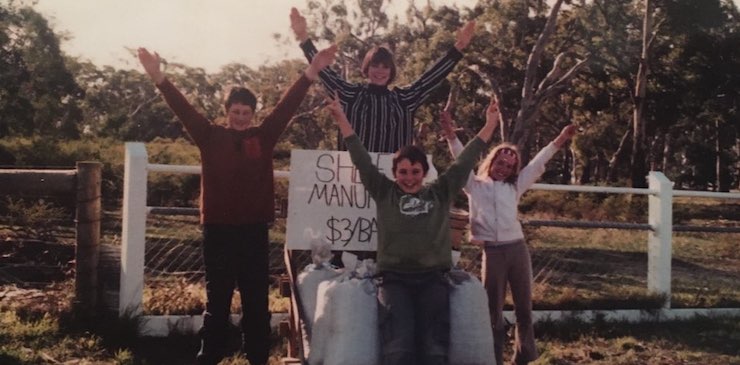7 Healthtech Lessons I Learned from Selling Poo in 2006
The story of my first business, and how it shaped my career in healthtech

I had a strong drive to engage in business from a young age, long before I started making apps and tinkering with software at Go Locum.
This was most apparent in the summer of circa 2006, when my cousins and I started our first business from home - an agricultural technology business that specialised in proprietary ovine fertiliser products for domestic use.
Namely, we sold sheep poo by the side of the road.
I spent many school holidays on various farms owned by my extended family, sometimes helping herd cattle or feed sheep, but it was on this occasion at my auntie and uncle’s property outside Bannockburn, Victoria, that my cousins Thomas, Georgia and my brother Isaac and I got the entrepreneurial itch, and got our hands dirty in the world of poo sales.
This is the story of that thriving small business, and a handful of hard lessons I learned that I still apply to this day in the world of health technology.
Both my auntie and uncle who lived on that property are quite entrepreneurially minded, and I suspect their influence contributed heavily to the formation of our manure company, as well my interest in entrepreneurship which would continue to grow over the following years.
The concept was simple. Many of the farms in Bannockburn ran sheep, which meant that there were dozens of woolsheds around the place absolutely overflowing with manure, which is a coveted resource for domestic and commercial gardens alike.
Sheep would be herded into a woolshed to be shorn, and potentially stay there for several hours during this process. Their droppings would fall down between the floorboards and coagulate at the bottom, building a concentrated gold mine of nutrients over the years.
If someone could only get under each woolshed to gather the poo, there’d surely be a demand for it.
So off we went, naively optimistic, and ill-prepared for the challenges that lay ahead.

New Hinge profile pic?
Lesson #1 - Use the right tool for the job
We asked a neighbour for access to their woolshed, who kindly agreed. He didn’t ask for a stake of the proceeds, which we considered to be a mistake given the avalanche of riches poised to come our way.
The details are a little hazy, but I remember on at least one of our harvesting days we had two shovels, one that was full-sized, and one that was more of a handheld size. Typically Thomas and I would be on our hands and knees under the woolshed using the large shovel to get the bulk of the goods close to “outside”, while Isaac and Georgia would be using the smaller shovel to fill the our large hessian sacks.
We quickly realised the shovel situation was a bottleneck in our ability to produce proprietary ovine fertiliser, and ultimately upgraded our kit to include several more large tools.
In doing this I learn It’s typically worth it to invest in tools that enable you to succeed or move more quickly, even if it feels expensive at the time.
Lesson #2 - Find a great team
Looking back I don’t think we could have had the success we did without a great team behind us. We had our auntie Linda who oversaw the operation, helped us broker deals with our neighbours, ferried our manure bags from the woolshed to our makeshift road-side stall, and so on. Then we had Thomas and I who would procure the goods from underneath, and Georgia and Isaac who would fill the bags, create signage, and load them onto our ute.
Having a great team has multiple benefits, including diversifying your skillsets, but also helping flattening out the waxing and waning levels of motivation and self-belief that solo founders can experience. This way, you’re always able to pick each other up and motivate each other when things are rough.
Lesson #3 - Be prepared for turbulent weather
Being 12 years of age around this time, I was sort of in that awkward pre-teen phase where I craved independence but was clearly not quite ready for the responsibilities it entailed. This meant I would pack my own bags for trips away, but would invariably do it very poorly. Whether it was forgetting my toothbrush, or including an alarmingly low number of socks and jocks for the two week trip, there was always something amiss.
On this occasion, it was failing to bring anything warmer than a t-shirt, which is a big problem in regional Victoria which is famous for having sunny days with freezing cold winds. After getting caught several times in this spot, I would return in future years more prepared for the weather challenges ahead.
And I’ve felt this in business too, albeit in different ways. For example, at Go Locum I remember not being psychologically prepared for the emergence of direct competitors, which is realistically unavoidable given any degree of substantial commerical success. It’s only by going through that do you become more prepared for it in the future.
Lesson #4 - Charge what you’re worth
When you’re getting started, there’s a tendency to price your offering quite low, perhaps far less than it’s worth. I think there are multiple reasons for this, one being that you might be unaware of the true costs associated with running a business, and another perhaps that you feel more comfortable being conservative with your pricing because it feels “safer” to ask for less from your customers.
In Bannockburn, we charged $3 per large bag of manure, which I can remember thinking was a lot of money (and in fairness, it probably was to a 12 year old) but when all was said and done, 4 of us had toiled in the fields for several days and netted ourselves in the region of $50 or $60.
Nowadays, I prefer to charge more and correct down if need be, rather than the other way around. There are multiple benefits to this, which may be the topic of a future article.
For healthtech companies, not charging enough, running free pilots, or not having a clear business model are all shortcuts to failure.
Lesson #5 - Run the numbers
I used to think financial projections were a bit of a meme reserved for corporate suits who want to somehow justify their continued employment, however I’ve since learned that running a series of napkin sums can actually help exclude a whole host of non-viable business lines very quickly.
This is very useful when you can consider that there are thousands of different ways you can conduct business, but only a few of them lead to truly desirable/profitable outcomes.
The real trick is excluding as many of the “dead-ends” as quickly and as cheaply as you can, and if you can do that quickly by modelling what a given business line could look like in various scenarios, then I believe that is a worthwhile exercise.
For us as pooslingers, we could have estimated quite quickly how many bags per day we could procure, then model our revenues based on our price per bag. This would have helped us determine whether this exercise was worthwhile, in the strictest business sense.
Of course, this experience became worth it for other reasons, but I don’t think it’s fair to say that it made sense on a dollars per hour basis.
Lesson #6 - Be wary of bad actors
Once we had some signage, and a makeshift pallet stall at the side of the road, we would drop our manure bags there each evening and wake up excitedly the next morning to check if we had any sales. Our stall operated on an honesty system, with the bags just sitting there with a coinbox on top.
I remember having several mornings where we sold out completely, and on those days the spoils of war were particularly sweet when you really feel you’ve earned absolutely every cent.
By the same token, as good as those days were, we also had some awful days when we’d return to our stall to find some bags missing and no coins in the box. Stealing from an honesty stall - isn’t that 7 years bad luck or something?
I’ve since learned that you will unfortunately come across clowns and time-wasters in multiple domains of life, not just business, and as much as those interactions hurt, it’s not worth worrying about them too much. You need to be prepared to brush them off and move on if you’re going to be able to roll with the punches over the long term.
Lesson #7 - Find something you love
It was a fun few weeks gathering and selling sheep poo in our holiday time, but it wasn’t too long before the shine wore off a little bit. As much as we enjoyed collecting our winnings each day, no-one in our business loved being underneath a woolshed, which was a delicious combination of dirty, smelly, sweaty and cold.
The advice “Find something you love” is a bit cliche perhaps, but having been through various stages of founder burnout myself, it’s something that hits close to home.
A business is a marathon and not a sprint, and it’s in those difficult times that you begin to understand the true value of having both a role that you genuinely enjoy, and an overall purpose for your business that is meaningful.
And for me, unfortunately that wasn’t shovelling poo into a bag.
